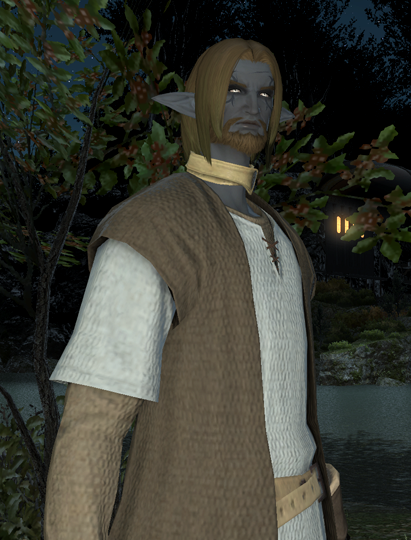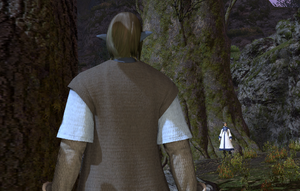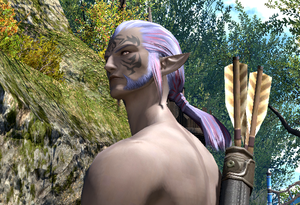Elder Megiddo
| Megiddo Desfosse | |
 "There is a man in the Shroud, an ancient Duskwight, who knows more about assassination and theft than anyone you've ever met." | |
| Gender | Male |
| Race | Duskwight |
| Clan | Desfosse |
| Citizenship | Not Applicable |
| Age | Elderly |
| Primary Linkshell | Commerce Regulation Agency |
| Religion | Acolyte of Oschon |
| Occupation | "Retired Hermit" |
| Relationship Status | Widower |
Contents
Basic Info
Known to very few in the Black Shroud as an anonymous hermit with no history, Megiddo has an extensive history as the patriarch of an entire clan of Duskwight that has been harrowed to near-extinction. Having lost most of his ancestors while he was young, then fathered the clan anew and watched it decimated once more, Megiddo has lost most of his want to be active in the world. He has a single living relative, a grand-daughter who is not related to him by blood, and has lost contact with her. Though he has been deprived of all family contact, Megiddo continues to seek connections with others. He learned to value The Twelve late in his life, Oschon, the Wanderer, especially, and he has reacted to the profound loss he has experienced by releasing control of his life to Oschon. Calling himself an acolyte of the god of vagrants and a "retired hermit", Megiddo has begun to wander the Black Shroud and seek personal connections with those whom he meets, believing that Oschon is guiding him and providing abstract purpose to what is left of his now meaningless life.
History
Clan Desfosse
First founded around two hundred years ago, Clan Desfosse was initially made up of refugees from other Duskwight Clans. Gathering in the Black Shroud near Gridania, the clan progenitors found a number of shallow caves in which to make their homes. Abandoning the cultures that they had known before congregating in the surface world, the adopted a new philosophy that taught vague forms of reverence for both their ancestors and the Twelve and placed utmost importance on those who are related by blood. With dual leadership by both a patriarch and matriarch (not always a mated pair), the clan was never large and was always built on powerful personal connections between its members. The clan drew its wisdom from its Elders, and the young were taught by the previous generation. Among other values, the theme most central to the clan was that nothing should be done for one's self; instead, one should act with others in mind and trust others to keep them in mind. No member of the clan can ask for or take anything for themselves, but when they ask for something within reason for one another, it was most often provided. The second most important value the clan taught to its members was that they must always exist in conflict with the overlanders; that is to say, those who are not Duskwight.
Conflict with Overlanders
Clan Desfosse did not cultivate food, barter trade goods or hunt what was permitted by the Gridanian hunting authorities. The clan lived through conflict. They were thieves, murderers, poachers and even professional assassins. Ruthlessness was a part of every child's curriculum, and they were all raised to believe that overlanders -- anyone who was not Duskwight -- would be hateful towards them and harm them if given the chance. Like the other children, Megiddo was taught the art of stealth and began to utilize it to steal resources for the family before he had even reached his teenager years. As he aged, he learned to compete with the local Miqo'te tribes when poaching for outlawed meat, and once he had mastered the hunting of animals he began to learn how to hunt people.
By the time Megiddo was bron, Clan Desfosse had already spend several generations becoming increasingly vicious. And Megiddo, his siblings and cousins, were the most ruthless yet. Led by his father and older siblings, Megiddo engaged in conflicts with both Gridanian defenders and Miqo'te poachers, as well as the private security workers of the merchants they frequently preyed upon. It was during this time that the shallow caves they used as home began, one by one, to be discovered by the various enemies Clan Desfosse had made.
Megiddo as Patriarch
The need to migrate their home each time it was discovered and being placed on the defensive more and more often over time, took its toll on Clan Desfosse. When Megiddo was a young man, the death of his father and two of his older siblings placed him in the unexpected position of leader. Older family members had become Elders, and Elders were not traditionally clan leaders. Though Megiddo drew on the wisdom of the Elders to help him cope with his sudden responsibility, he also boldly and stubbornly shifted the paradigm of the tribe away from open ruthlessness. Instead of pursuing vengeance for the death of his father, Megiddo let the murder go unpunished, citing a lesson his father himself had taught him about postponing retaliation. Megiddo retreated far from the conflicts his family had begun. This does not mean, however, that he suddenly became kind and cooperated with those around him.
As patriarch of Clan Desfosse, Megiddo refined the cold ruthlessness he had always favored and taught his living brothers how to be assassins instead of simply killers. To Megiddo, the problem had never been the ruthlessness with which they had acted, but instead the fact that they had let themselves be seen, heard, and followed. After a five-year period of recovery during which Megiddo forbade anyone in Clan Desfosse from entering into conflict with an overlander for any reason, the new patriarch of the clan once again threw open the floodgates and let the killing resume. This time, the killing was cold, ruthless, silent. Always in the dark, and each death was a stifled whimper where the victim wished desperately to scream.
The greatest change, though, was a new rule that Megiddo laid down to the clan: whenever they stole, they would take everything, and no one was to be left alive. Instead of simply stealing food and committing highway robbery, they were now conducting raids. They only went out once a month now, as opposed to once every few days, but the number of murders was multiplied several times over under Megiddo's leadership.
The Decline of Clan Desfosse
Megiddo lead his clan as patriarch for sixty years, twenty years past the point that he should have passed on leadership to one of his sons and moved on to the role of Elder. He continued to lead through a
combination of stubbornness, frustration with children who did not live up to his expectations, and the deaths of several of his older sons. Over decades, Megiddo married and lost his wives to death in conflict several times, and lost half a dozen children the same way. The Elders of his clan were claimed by time, his cousins by violence or accident. And each death increased the pressure on Clan Desfosse. The longer Megiddo lead his clan, the more sons and daughters he lost to violence, the less patience his children had for constant conflict. In Megiddo's generation, Clan Desfosse had grown its most ruthless, but it seemed as though it had reached the greatest threshold possible for such violence, and on the other side was a generation that did not see the need for it.
As Megiddo neared his eightieth year and his body was practically on the verge of falling apart, his mind was still sharp and his anger towards the overlanders unchanged. His oldest surviving son, however, was in his mid thirties, strong of will and body, and he demanded the leadership of Clan Desfosse at the point of an arrow. Megiddo relented, and watched as his son attempted to save the clan (which was at this point as sparse handful of siblings) by making peace with a nearby tribe of Miqo'te poachers and seeking to bring fresh members in from other Duskwight clans. These attempts would fail, though.
In the end, the Calamity would claim what was left of Clan Desfosse. Though no longer the clan's leader, Megiddo refused to let his children go to the Battle of Cartenau. Some of them did, some of them did not, but the Calamity took all of them with its fire. The survivors were Megiddo himself, and his son's adopted daughter, whom he did not recognize as family because there was no true blood between them.
Present
An Acolyte of Oschon
Having lost everything and found himself not only alone, but substantially weakened by time and unable to breed, Megiddo left the cavern of the Elders and began to wander the woods of Gridania as a lone hermit. Clan Desfosse was built on two principles -- the service of family and conflict with the overlanders -- but his family was dead and he had grown too old for conflict. Without his culture or his home, Megiddo recalled the teachings of his grandfather, the reverence of one's ancestors and reverence of the Twelve. Even without a purpose, Megiddo did not wear despair well, and so he decided to give himself over to acts of reverence. As a vagrant and a wanderer, he turned his mind to the god of such: to Oschon, the Wanderer.

Megiddo wandered the Black Shroud and gave no thought to where he was or where he was going; he distracted his pale eyes by remembering as much as he could of the family members that had gone before him, pondering reverently their teachings and actions. And so blindly, he wandered for days, sleeping in pits in the ground and dreaming of painful memories that hurt him well.
Until he came upon an outlying town near Gridania which had been devastated by the Calamity. It was the kind of place he would have led his clan to decimate two decades ago, but he had no wish to do so now. The settlement was populated by overlanders: Wildwood Elezen and Hyur who looked on him with distrust. Despite this, when he offered his meager strength to help them, they accepted. He met them, got to know them, and wandered again. Almost too fast, he found himself on the other side of the Shroud, in a similar place, similarly broken. Again, he offered to help the overlanders recover from the Calamity, and he again he was able to connect to people he never would have spoken with before. Another half a day of slow wandering, and he find himself three day's walk away, in Thanalan. There he once again aided overlanders who were suffering as a result of the Calamity.
To Megiddo, these acts are not contrary to the teachings of Clan Desfosse. They are, however, contrary to what he had taught his own children. He figures his situation has changed so significantly that he merely must engage in another kind of conflict with the overlanders: a social one. They still loathe him as a Duskwight, and rightfully so. Their hatred sits well upon his shoulders, he thinks. Accordingly, Megiddo wanders and lets Oschon move him from place to place, eagerly meeting new people and helping them if he is able.
Secrets
That would be a decent place to end the story: Megiddo has caused great suffering and suffered greatly as a result, yet now he has become a kind but vaguely unsettling hermit who wanders the forest helping people. It's a decent ending. But that isn't the end. Megiddo is only in his eighties and has perhaps a decade left, and do not be fooled: this is the very same man who raised his children to be killers. He wears a hermit's linens, with berry-picking gloves on his hands at times, or goggles on his face to protect his eyes. But a keen eye may see the glint of steel in his bags, or the occasional wandering grimace of a man who, at a different time, would have been capable of silently snuffing you out, without letting you utter any last words.
He speaks of vengeance sometimes. He'll tell a story of a grandson who suffered terribly after the Calamity, of how the young man's body was twisted and turned hideous by wild aether, and of the woman who is responsible for this crime. If you get to know him well enough, he will speak of hate, of taking penance for wrongs committed. But then, his father did teach him to postpone retribution, and he will speak of that as well.
There is a man in the Shroud, an ancient Duskwight, who knows more about assassination and theft than anyone you've ever met. He comes from a long line of assassins, raised his sons and daughters to be the most ruthless killers in the Shroud. This man has been honing his skills for almost a century. And yes, he is old, but his hands still move with skill, his eyes are alive with the teachings of his ancestors, his mind sharp, and his senses more attuned than those of most young men. Lately, he has become very agreeable, even eager to be sought out. And if you want to find this old assassin, this Elder Megiddo, you need only walk into the Black Shroud, get yourself lost, and let Oschon guide your footsteps. The Wanderer will bring you to him, and then you need only ask him to help you.
Relationships
[coming soon]
Abilities
[coming soon]
Links
[coming soon]

